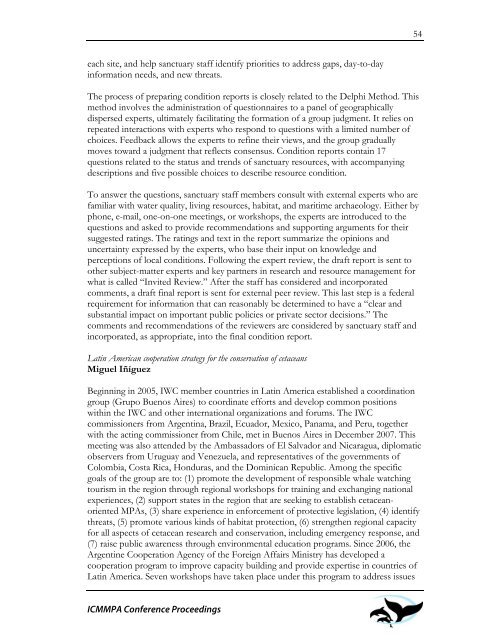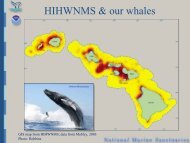The First International Conference on Marine Mammal Protected Areas
The First International Conference on Marine Mammal Protected Areas
The First International Conference on Marine Mammal Protected Areas
Create successful ePaper yourself
Turn your PDF publications into a flip-book with our unique Google optimized e-Paper software.
each site, and help sanctuary staff identify priorities to address gaps, day-to-day<br />
informati<strong>on</strong> needs, and new threats.<br />
<str<strong>on</strong>g>The</str<strong>on</strong>g> process of preparing c<strong>on</strong>diti<strong>on</strong> reports is closely related to the Delphi Method. This<br />
method involves the administrati<strong>on</strong> of questi<strong>on</strong>naires to a panel of geographically<br />
dispersed experts, ultimately facilitating the formati<strong>on</strong> of a group judgment. It relies <strong>on</strong><br />
repeated interacti<strong>on</strong>s with experts who resp<strong>on</strong>d to questi<strong>on</strong>s with a limited number of<br />
choices. Feedback allows the experts to refine their views, and the group gradually<br />
moves toward a judgment that reflects c<strong>on</strong>sensus. C<strong>on</strong>diti<strong>on</strong> reports c<strong>on</strong>tain 17<br />
questi<strong>on</strong>s related to the status and trends of sanctuary resources, with accompanying<br />
descripti<strong>on</strong>s and five possible choices to describe resource c<strong>on</strong>diti<strong>on</strong>.<br />
To answer the questi<strong>on</strong>s, sanctuary staff members c<strong>on</strong>sult with external experts who are<br />
familiar with water quality, living resources, habitat, and maritime archaeology. Either by<br />
ph<strong>on</strong>e, e-mail, <strong>on</strong>e-<strong>on</strong>-<strong>on</strong>e meetings, or workshops, the experts are introduced to the<br />
questi<strong>on</strong>s and asked to provide recommendati<strong>on</strong>s and supporting arguments for their<br />
suggested ratings. <str<strong>on</strong>g>The</str<strong>on</strong>g> ratings and text in the report summarize the opini<strong>on</strong>s and<br />
uncertainty expressed by the experts, who base their input <strong>on</strong> knowledge and<br />
percepti<strong>on</strong>s of local c<strong>on</strong>diti<strong>on</strong>s. Following the expert review, the draft report is sent to<br />
other subject-matter experts and key partners in research and resource management for<br />
what is called “Invited Review.” After the staff has c<strong>on</strong>sidered and incorporated<br />
comments, a draft final report is sent for external peer review. This last step is a federal<br />
requirement for informati<strong>on</strong> that can reas<strong>on</strong>ably be determined to have a “clear and<br />
substantial impact <strong>on</strong> important public policies or private sector decisi<strong>on</strong>s.” <str<strong>on</strong>g>The</str<strong>on</strong>g><br />
comments and recommendati<strong>on</strong>s of the reviewers are c<strong>on</strong>sidered by sanctuary staff and<br />
incorporated, as appropriate, into the final c<strong>on</strong>diti<strong>on</strong> report.<br />
Latin American cooperati<strong>on</strong> strategy for the c<strong>on</strong>servati<strong>on</strong> of cetaceans<br />
Miguel Iñíguez<br />
Beginning in 2005, IWC member countries in Latin America established a coordinati<strong>on</strong><br />
group (Grupo Buenos Aires) to coordinate efforts and develop comm<strong>on</strong> positi<strong>on</strong>s<br />
within the IWC and other internati<strong>on</strong>al organizati<strong>on</strong>s and forums. <str<strong>on</strong>g>The</str<strong>on</strong>g> IWC<br />
commissi<strong>on</strong>ers from Argentina, Brazil, Ecuador, Mexico, Panama, and Peru, together<br />
with the acting commissi<strong>on</strong>er from Chile, met in Buenos Aires in December 2007. This<br />
meeting was also attended by the Ambassadors of El Salvador and Nicaragua, diplomatic<br />
observers from Uruguay and Venezuela, and representatives of the governments of<br />
Colombia, Costa Rica, H<strong>on</strong>duras, and the Dominican Republic. Am<strong>on</strong>g the specific<br />
goals of the group are to: (1) promote the development of resp<strong>on</strong>sible whale watching<br />
tourism in the regi<strong>on</strong> through regi<strong>on</strong>al workshops for training and exchanging nati<strong>on</strong>al<br />
experiences, (2) support states in the regi<strong>on</strong> that are seeking to establish cetaceanoriented<br />
MPAs, (3) share experience in enforcement of protective legislati<strong>on</strong>, (4) identify<br />
threats, (5) promote various kinds of habitat protecti<strong>on</strong>, (6) strengthen regi<strong>on</strong>al capacity<br />
for all aspects of cetacean research and c<strong>on</strong>servati<strong>on</strong>, including emergency resp<strong>on</strong>se, and<br />
(7) raise public awareness through envir<strong>on</strong>mental educati<strong>on</strong> programs. Since 2006, the<br />
Argentine Cooperati<strong>on</strong> Agency of the Foreign Affairs Ministry has developed a<br />
cooperati<strong>on</strong> program to improve capacity building and provide expertise in countries of<br />
Latin America. Seven workshops have taken place under this program to address issues<br />
ICMMPA <str<strong>on</strong>g>C<strong>on</strong>ference</str<strong>on</strong>g> Proceedings<br />
54



